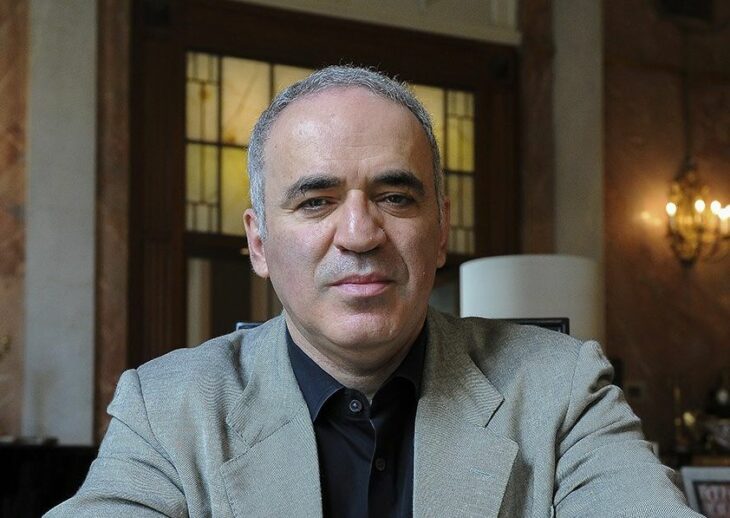
Like millions of others who lived behind the Iron Curtain, I grew up in the Soviet Union viewing America as a beacon of hope. The difference between free and unfree was readily apparent to me as a young player on the international chess scene, and I began to use my platform to protest repressive practices back home. When I retired from professional chess in 2005, I channeled all of my energy into preventing Russia from sliding back into the hands of the KGB, the Soviet Union’s secret police and most sinister spy agency. Unfortunately, those efforts were unsuccessful: Vladimir Putin consolidated power and rebuilt an authoritarian state in the image of the Soviet regime under which I was born. Facing imminent arrest, I was forced into exile and have lived in New York since 2013. I never thought I would need to warn Americans about the dangers of dictatorship.
Donald Trump has been breaking down the guardrails of American democracy for nearly a decade now. Generations to come will reap the consequences. His presidency – and his three campaigns for the office – have demonstrated that the institutions so many of us took for granted are, in large part, based on custom and tradition, not written law. As Ronald Reagan famously said, freedom is “never more than one generation away from extinction”. The political system we hold dear is deeply fragile, and depends on our constant commitment to uphold it.
Trump hasn’t even won the election yet – and his victory is far from assured – but we are already seeing signs of preemptive obedience that should look familiar to many refugees from repressive regimes like me. Both the Washington Post and Los Angeles Times canceled endorsements of Vice President Kamala Harris earlier this month at the behest of their owners, a de facto silencing of two major national newspapers. It should come as no surprise that business owners are careful to avoid upsetting someone who has frequently called for his detractors to be locked up, or in the case of Liz Cheney, have guns “trained on her face.”
Given my experience, I am not willing to stand idly by and watch the beacon of hope that I am grateful to now call home slide into the authoritarianism of my childhood. This election is a choice between a candidate who has vowed to fight for America’s institutions, and one who is deeply dangerous – a candidate who I believe will bring total mayhem and destruction to this country.
I want to speak, now, more specifically about Kamala Harris.
I have never been shy about criticizing administrations, regardless of party. I harshly condemned Barack Obama’s foreign policy – from his fecklessness in Syria to his dangerous Iran deal – as well as George W. Bush’s naivete when he claimed to have seen Putin’s soul after peering into his eyes. My criticism of both Trump and Joe Biden has been far from quiet. Only 28 percent of Americans today believe the country is moving in the right direction, and I understand their frustrations. While the situation at home certainly raises concerns, the geopolitical landscape is disastrous; the worst I have seen in my living memory. America’s prestige abroad is disintegrating. No wonder, then, that Trump’s hate-filled rhetoric is finding purchase.
But the role of the president and the vice president is not the same. With the notable exception of Dick Cheney (and perhaps Mike Pence when it counted the most), no vice president in recent memory played any meaningful role in setting policy. They do not hold the same responsibility as their boss for the direction the country takes. Biden essentially functioned as Barack Obama’s messenger, because his main task as vice president for eight years was to carry out and effectively communicate Obama’s vision—not his own. The same has been true of Kamala Harris for the last four years; her job has been to further Biden’s agenda, not her own. Consequently, J.D. Vance’s constant refrain – as vice president for nearly four years, Harris owns Biden’s policies – doesn’t make sense. It wasn’t Harris’ job to put her ideas into practice. And while she initially hewed closer to the administration’s stance, she has since stepped out from her boss’s shadow, making clear in interviews and on the campaign trail that she will not just follow in Biden’s footsteps. The policy proposals she is offering, whether you agree with them or not, are her own.
In an area particularly close to my heart – foreign policy – Harris’ agenda would represent an improvement from the status quo. Biden has spent many of his 40 years in government during a time when the threat of nuclear war was high, and that experience has undoubtedly informed his approach to foreign policy as president. Harris, on the other hand, doesn’t carry the same Cold War baggage, and has said that she would not allow Ukraine to succumb to Russian aggression. I don’t believe her administration would continue the Biden administration’s policies of betrayal when it comes to Ukraine – and Trump and Vance have obviously made no secret of their plans to essentially give in to Putin’s desire to swallow Ukraine.
Because Harris hasn’t been on the foreign policy scene for decades, my prediction is that she will hew closely to public opinion, which is currently oriented around a consensus that America should stand up to dictators. And on the domestic front, as a new president interested in being reelected – and likely constrained by a divided Congress and conservative Supreme Court majority – Harris would be unlikely to make waves and institute radical progressive policies.
Were Harris up against a Republican other than Trump, disagreements over her limited price controls, tax policy, or stance on social issues might constitute strong arguments against electing her. In this race, however, these arguments are moot. If you disagree with her policies, start challenging her the day after the election. I certainly will.
This election is bigger than policy, as the long list of prominent Republicans who are willing to stand up and support Harris demonstrates. Former Vice President Dick Cheney and his daughter, Liz; former California Gov. Arnold Schwarzenegger; former Sen. Jeff Flake; several members of Trump’s own administration, including some of the most senior. Many still align with Republicans on policy issues – some, in the case of Reps. Cheney and Adam Kinzinger, even voted for Trump in 2020. Unlike sycophantic outcasts like Robert F. Kennedy Jr., who made the reverse journey from the Democratic Party to endorse Trump, these are true, dyed-in-the-wool Republicans.
Legally, we have a choice in this election, but morally, the answer is clear: If we want to preserve America’s institutions and its standing on the world stage, we must elect Kamala Harris on November 5.
Ultimately, I am cautiously optimistic about a Harris presidency. She has the opportunity to normalize a deeply fractured political climate, to bring together the center-left and center-right under a banner of creating real opportunity for all Americans. I look forward to challenging her when we disagree, which I imagine will be often. But if her opponent is elected, the very institutions and traditions that guarantee our right to freely disagree would be under threat. Anyone who has lived in the Soviet Union or in Putin’s Russia will tell you what it’s like to fear publicly condemning the government. In Trump, I hear echoes of Soviet leaders past and Russian leaders present. Kamala Harris’ election is the only way to preserve democracy, at home and abroad. She may not be the best choice. But on November 5, she is the only one.





